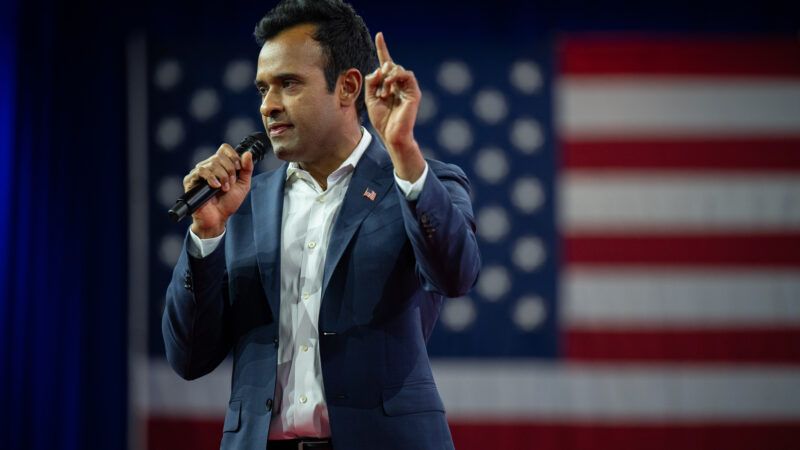No, Vivek Ramaswamy, a Libertarian-Nationalist Alliance Doesn't Make Sense
He says the two ideas "are not in tension with one another." He's wrong.

While speaking at the Libertarian National Convention (LNC) on Friday, tech entrepreneur and failed GOP presidential candidate Vivek Ramaswamy floated an idea upon which he said the "future of this country depends."
All that it requires is for libertarians to decide to support a larger, more powerful federal government.
"I believe that the future of this country depends on a libertarian-nationalist alliance that will save this country," Ramaswamy argued from the main stage at the LNC, where he also debated Clint Russell, one of several men running for the Libertarian Party's vice presidential nomination.
Those comments were met with a smattering of boos from the crowd of Libertarian delegates—and for good reason. There are many factions of libertarians, of course, but the one belief that unites the movement is an understanding that individuals are best suited to make their own decisions about how to live. Nationalism, at its root, is a fundamentally collectivist idea that prioritizes the needs of the state over the choices of individuals.
In off-stage comments to Reason at the LNC, Ramaswamy reiterated his belief in a libertarian-nationalist alliance. When pushed to explain how two seemingly opposing viewpoints could find common ground, he argued that the two are "not overlapping objectives, but they are not in tension with one another."
"When I say 'nationalist,' I mean a revival of our national identity," Ramaswamy explained to Reason TV's Zach Weissmueller (whose video coverage of the LNC will be forthcoming). "I don't think that's counter to libertarian principles at all. I think we've lost that national pride and identity in our country, and I think that is a foundational issue."
With all due respect to Ramaswamay, that's a load of crap. The current wave of nationalism sweeping the right wing of American politics is not about innocent-sounding things like restoring national pride. Its proponents are quite open about the fact that they want to grow the power of the state to pursue things like industrial policy, aggressive deportations, and even very silly stuff like banning lab-grown meat.
That puts the two perspectives very much in tension. In practice, libertarians advocate for decreasing the power of the state to control individual freedom. Nationalists have no qualms about limiting the free movement of people or goods if those restrictions are seen to be—or imagined to be—in the amorphous interests of the country (which really means in the best interest of whatever special interest manages to control the policymaking apparatus).
Thankfully, the future of the country doesn't rest on Ramaswamy's idea, because his idea is frankly insane. It's a bit like suggesting that the Boston Red Sox and New York Yankees team up to win the American League—except actually worse because in this analogy the Yankees don't want to win baseball games, they want to police your personal and financial choices.
Of course, the obvious subtext of Ramaswamy's comments becomes clear once you recall that he's now an official surrogate for former President Donald Trump, who is scheduled to address the LNC on Saturday night. The deal Ramaswamy is really offering goes like this: libertarians should vote for Trump. There is no second part.
Ramaswamy was once a college libertarian and may at times still espouse libertarian ideas—indeed, he was sometimes the most libertarian candidate on stage during the Republican primary debates earlier this year (though he was also often one of the loudest advocates for authoritarian ideas.) None of that matters right now, because Ramaswamy's job through the first week of November is convincing people to vote for Trump. Libertarians should not be naive about this.
Yes, politics is the art of compromise and, yes, libertarian goals can be achieved (and must be achieved) by working with people who are not libertarians. Trump, despite all his deficit-spending and tariff-hiking and wall-building, did sign the First Step Act. President Joe Biden, despite all his deficit-spending and tariff-hiking and loan-forgiving, did end the war in Afghanistan.
Libertarians should always be ready to nudge those in power toward decisions that increase freedom—but we have no obligation to help anyone achieve power in the first place.
That matters, because Ramaswamy does not seem to be suggesting an acute alliance aimed at specific policy goals. His remarks to Reason and on stage at the LNC suggest a high-level, strategic alliance between two competing political philosophies for the purposes of increasing electoral success. That is, for the goal of achieving political power for its own sake.
Libertarians ought to reject such will-to-power arguments—and boo anyone who makes them, as delegates to the LNC did. An electoral alliance with those who wish to enlarge the state's power over individuals, corporations, and markets is not the path to greater freedom.


Show Comments (310)